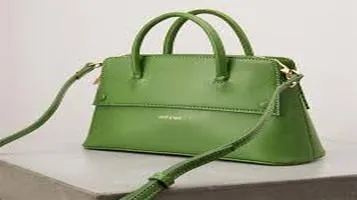Plant-Based Leather Bags – A Sustainable Revolution in Fashion
Plant-based leather bags are an innovative and sustainable alternative to traditional leather products. Crafted from materials such as pineapple leaves, apple peels, cork, and cactus, these bags offer an eco-friendly solution that reduces reliance on animal hides and lowers environmental impact. The innovative production processes often utilize fewer chemicals, water, and energy, contributing to a more sustainable fashion industry. Despite their plant-based origins, these bags maintain the luxurious look and feel of genuine leather, boasting durability and style. Available in various designs and colors, plant-based leather bags cater to fashion-forward individuals who prioritize ethics and sustainability. They represent a growing trend towards conscious consumerism, appealing to those who seek to make a positive impact on the planet without compromising on style or quality.

In a world increasingly conscious of environmental sustainability and ethical practices, plant-based leather bags have emerged as a revolutionary alternative to traditional leather. Combining innovation with style, these bags cater to the growing demand for eco-friendly fashion without compromising on quality or aesthetics. As someone who has explored various brands and products within this burgeoning market, I am excited to share my insights on plant-based leather bags and their potential to redefine the fashion industry.
Eco-Friendly Elegance
The foremost appeal of plant-based leather bags lies in their eco-friendly nature. Traditional leather production is notorious for its environmental impact, involving resource-intensive processes, harmful chemicals, and significant carbon emissions. Conversely, plant-based leather is crafted from sustainable materials such as pineapple leaves (Piñatex), apple peels, mushrooms (Mylo), and even cactus (Desserto). These innovative materials require fewer resources, generate less waste, and often utilize by-products from other industries, making them a more sustainable choice.
One of the standout brands in this category is Matt & Nat, known for their commitment to using recycled materials and eco-conscious production methods. Their range of plant-based leather bags offers sophisticated designs that seamlessly blend form and function. For instance, the Brave Backpack is a versatile piece that can transition from a workday essential to a weekend companion, all while making a statement about your commitment to sustainability.
Quality and Durability
A common misconception about plant-based leather is that it may not match the durability of traditional leather. However, advancements in material technology have ensured that plant-based leather can be just as robust and long-lasting. My experience with Luxtra London, a brand specializing in apple leather bags, has been particularly enlightening. Their bags exhibit impressive durability, weather resistance, and ease of maintenance.
The Sofia Tote by Luxtra, made from apple leather, has been my go-to bag for over a year. Despite daily use, it shows minimal signs of wear and tear, a testament to the quality of the material. The bag's structure has remained intact, and it continues to garner compliments for its sleek design and unique texture. This durability ensures that plant-based leather bags are not just a fleeting trend but a viable, long-term alternative to animal leather.
Ethical and Cruelty-Free
One of the most compelling reasons to choose plant-based leather bags is their ethical production. Traditional leather involves the use of animal hides and often raises concerns about animal welfare and cruelty. In contrast, plant-based leather entirely eliminates the need for animal products, aligning with the values of veganism and animal rights advocacy.
Brands like Angela Roi have made a name for themselves by prioritizing ethics alongside aesthetics. Their Grace Crossbody bag, crafted from eco-friendly PU leather, is not only stylish but also embodies a commitment to cruelty-free fashion. Angela Roi's dedication to fair labor practices and ethical production further enhances the appeal of their products, making them a favorite among conscious consumers.
Style and Versatility
Plant-based leather bags do not compromise on style. The versatility of these materials allows for a wide range of designs, textures, and finishes, catering to diverse fashion preferences. From minimalist and modern to bold and eclectic, there is a plant-based leather bag to suit every taste.
The Gunas New York collection, for example, showcases a variety of designs that demonstrate the versatility of plant-based leather. The Cottontail bag, made from mulberry leaf pulp, is a chic and playful accessory that adds a touch of whimsy to any outfit. On the other hand, the Flame Satchel, crafted from polyurethane, offers a more classic and sophisticated look. These options highlight how plant-based leather can be molded into virtually any design, providing ample choices for fashion enthusiasts.
Affordability and Accessibility
While plant-based leather bags may sometimes carry a higher price tag than their synthetic counterparts, they offer excellent value for money considering their sustainability, durability, and ethical production. Additionally, as the market for plant-based leather continues to grow, we can expect prices to become more competitive, making these products more accessible to a wider audience.
Several brands have already made strides in this direction. Corkor, for instance, offers an affordable range of cork leather bags that do not skimp on quality or style. Their Cork Backpack is a functional and budget-friendly option that appeals to eco-conscious consumers looking for a practical everyday bag.
Conclusion
Plant-based leather bags represent a significant step forward in the fashion industry's journey toward sustainability and ethical practices. By choosing these bags, consumers can support innovative materials, reduce their environmental footprint, and promote cruelty-free fashion. With an increasing number of brands embracing this sustainable alternative, plant-based leather bags are poised to become a staple in the wardrobes of conscious consumers worldwide.
In summary, my experience with plant-based leather bags has been overwhelmingly positive. The blend of eco-friendliness, durability, ethical production, and stylish design makes them a compelling choice for anyone looking to make a difference through their fashion choices. As this trend continues to grow, I am excited to see how plant-based leather will further evolve and inspire a more sustainable future in fashion.






